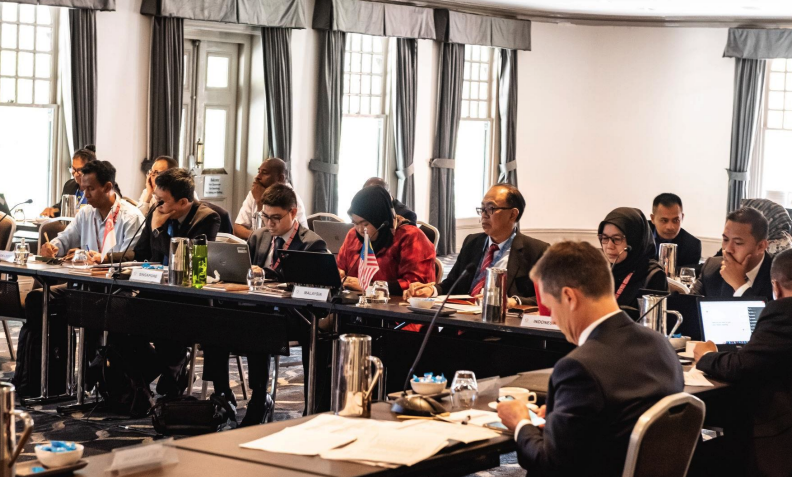No individual country can stamp out illegal fishing on their own. Regional networks such as the RPOA-IUU (The Regional Plan of Action to promote responsible fishing practices including combating IUU fishing in the region) provide an opportunity for collaborative solutions. Two important areas of collaboration were identified by the RPOA-IUU working together with the ATSEA-2 Project. Firstly, the need for closer information-sharing between RPOA-IUU members to tackle the shared problems of IUU that they face. Secondly, the need for capacity-building in the areas of monitoring, control and surveillance (MCS).
This report outlines what is already happening regionally concerning information-sharing and MCS training, and the key issues/needs that RPOA-IUU countries have, before proposing a way forward. Using a mixed-methods approach of a desk-based review, key informant interviews and focus group discussions, nine key themes for information-sharing were identified, along with nine needs for MCS capacity-building. The nine information-sharing themes were:
1. Goodwill. Members appreciate being part of RPOA-IUU and recognise that information sharing is valuable.
2. Networking. Members want better networking and more regular meetings, especially sub-regional meetings.
3. Benefits. Members want to see incremental progress towards tangible benefits that will combat IUU fishing.
4. Terminology. Members want to agree on precise terminology and use this consistently.
5. Products. Members want information/intelligence products that can be used for prioritizing where to deploy assets and for prosecutions. They do not want just more data.
6. Coordination. For some members, in-country coordination between government departments is lacking.
7. Commitment. Members recognise that commitment from a high level of government will be needed for data-sharing.
8. Culture. Evaluating failure is difficult for some countries in particular because of the sense of shame attached to this.
9. Duplication. Future information-sharing needs to complement and not duplicate current activities.
The nine capacity-building needs identified by members were:
1. Data analysis. In particular, unlocking the potential of Vessel Monitoring Schemes.
2. Prioritizing enforcement activities. Having systems in place to sift through large quantities of data to prioritize deployment.
3. Integrated governance. Having different government departments within a country collaborating rather than competing.
4. Port State Measures Agreement (PSMA). Ensuring national legislation and implementation are aligned with PSMA.
5. Conducting fisheries inspections. Ensuring inspections are utilising best practices.
6. Securing a prosecution. Including improving evidence gathering and storage.
7. MCS training is conducted at national/local levels. Capacity-building would be most valuable if it was tailored to the needs of individual countries rather than generic training for the region.
8. Voluntary compliance. Cultivating an environment where registered vessels take part of the responsibility for ensuring compliance.
9. Legal training. Increasing awareness of fisheries legislation (national and international) among legal personnel involved in prosecutions.
A way forward is proposed that includes the following nine steps that will help the RPOA-IUU move towards effective information-sharing.
1. Vision. Clarifying how information-sharing can make a significant contribution to combating IUU fishing.
2. Concrete examples. Support RPOA-IUU members in the sub-regional groups to identify those specific issues where sharing information will help them.
3. Identify and prioritize data that countries are willing to share, that is not too expensive and that will have a significant impact on reducing IUU fishing.
4. Commitment. In tandem with step 5, building trust and commitment between subregional group members so they are willing to attempt information-sharing for a specific issue.
5. Quick wins. Identifying the ‘low-hanging’ fruit, even steps as simple as countries having reliable focal points in neighboring countries will build confidence in the process.
6. Technical practicalities. Ensuring that the processes to store and manage the information that is shared are clear.
7. Written agreements and guidelines that detail the principles and policies that underpin information-sharing. For example, no data will be shared with a third party without written permission from the country that owns the data.
8. Access and align with other regional initiatives. Encourage RPOA-IUU members to make use of existing platforms and ensure RPOA-IUU information-sharing complements and not duplicates the work of others.
9. Additional capacity needs to be brought in where this can add value. For example, this could be analytical expertise with VMS data or IT expertise with managing databases.
The report concludes by affirming that the existing sub-regional group structure in the RPOA-IUU will be the most effective way to make progress with information-sharing and that this needs to focus on finding practical solutions to real-life challenges that RPOA-IUU members face.

